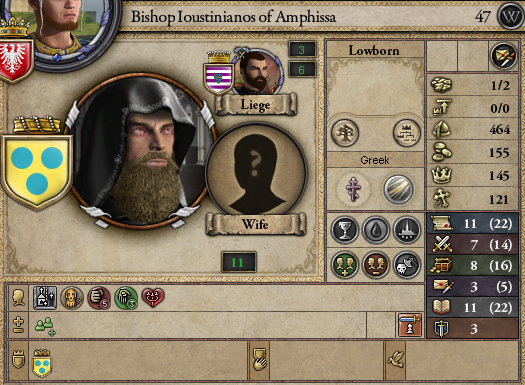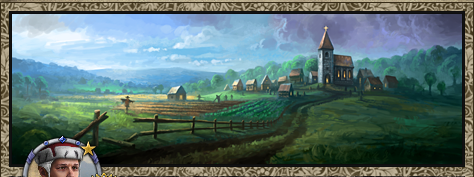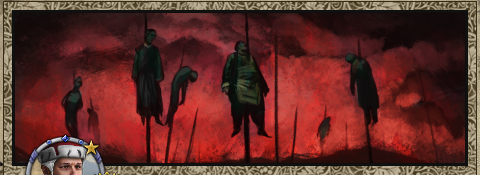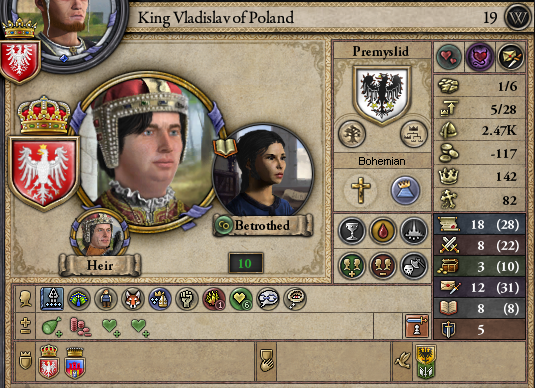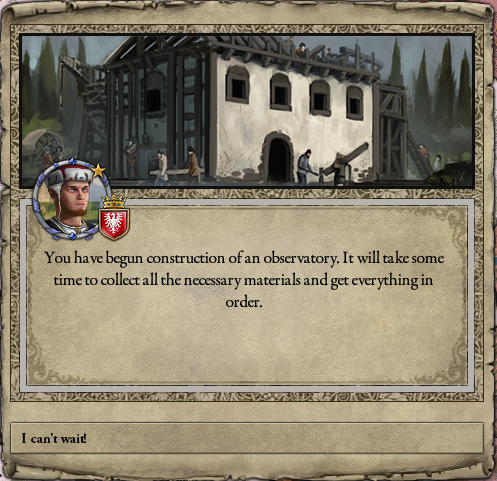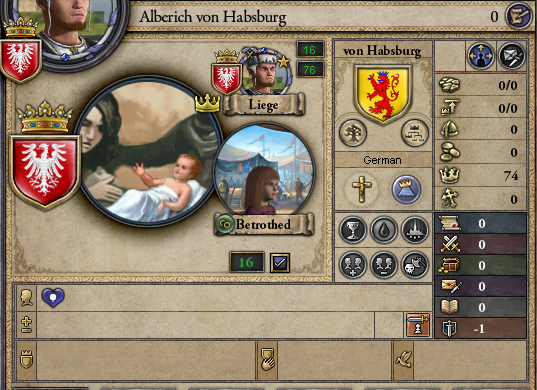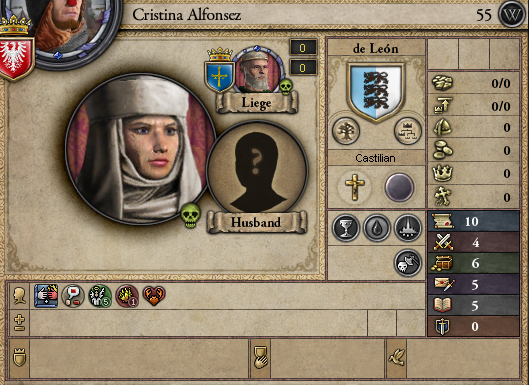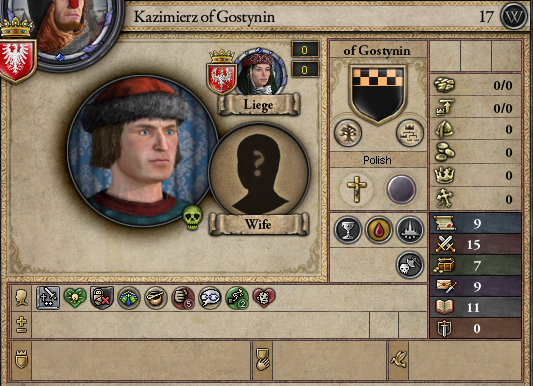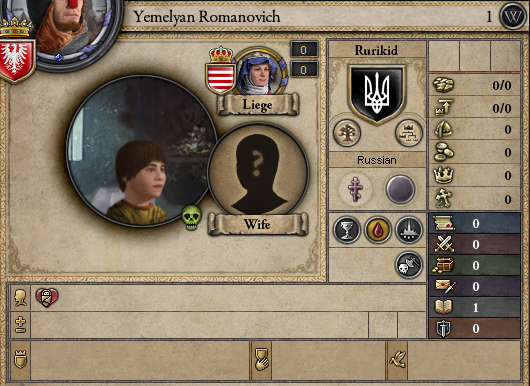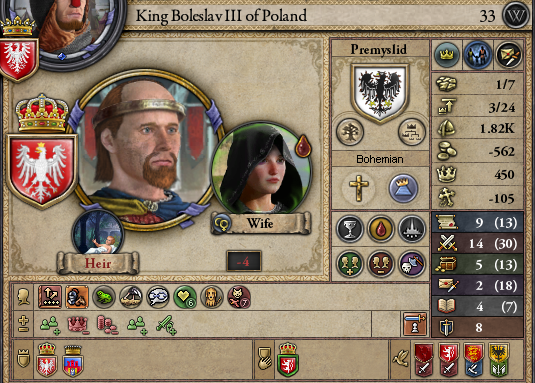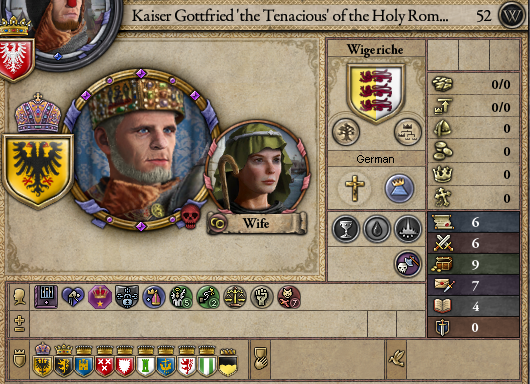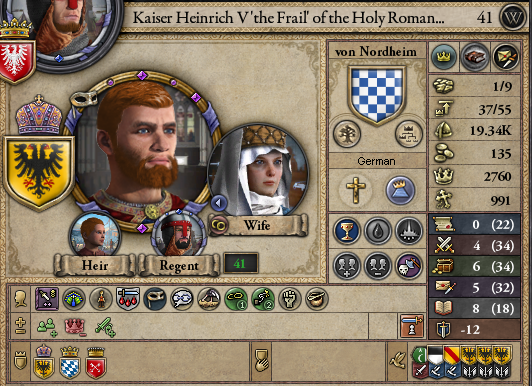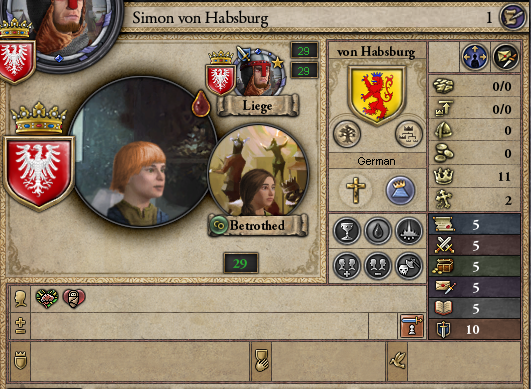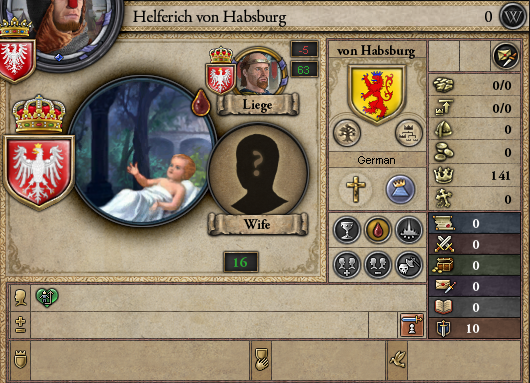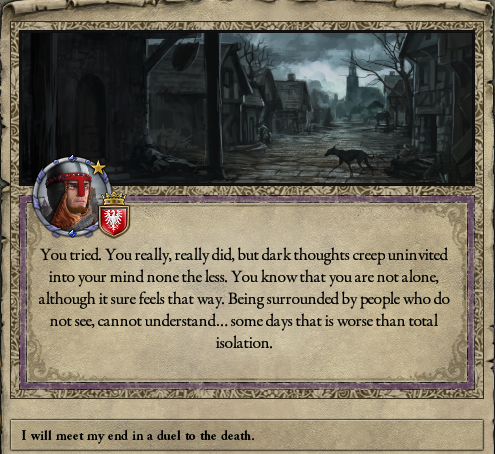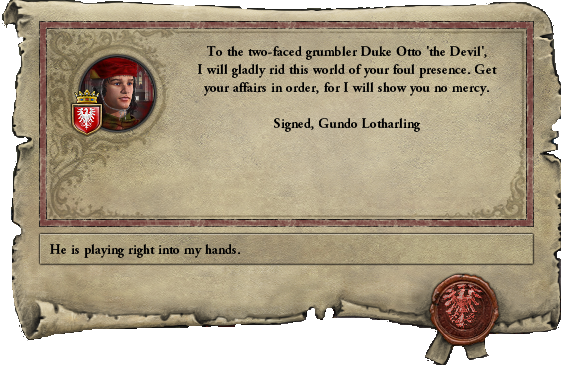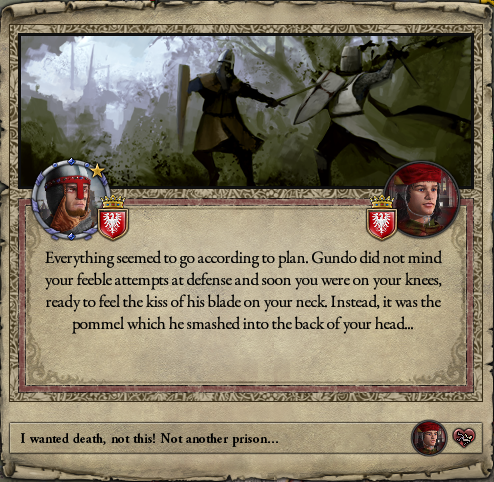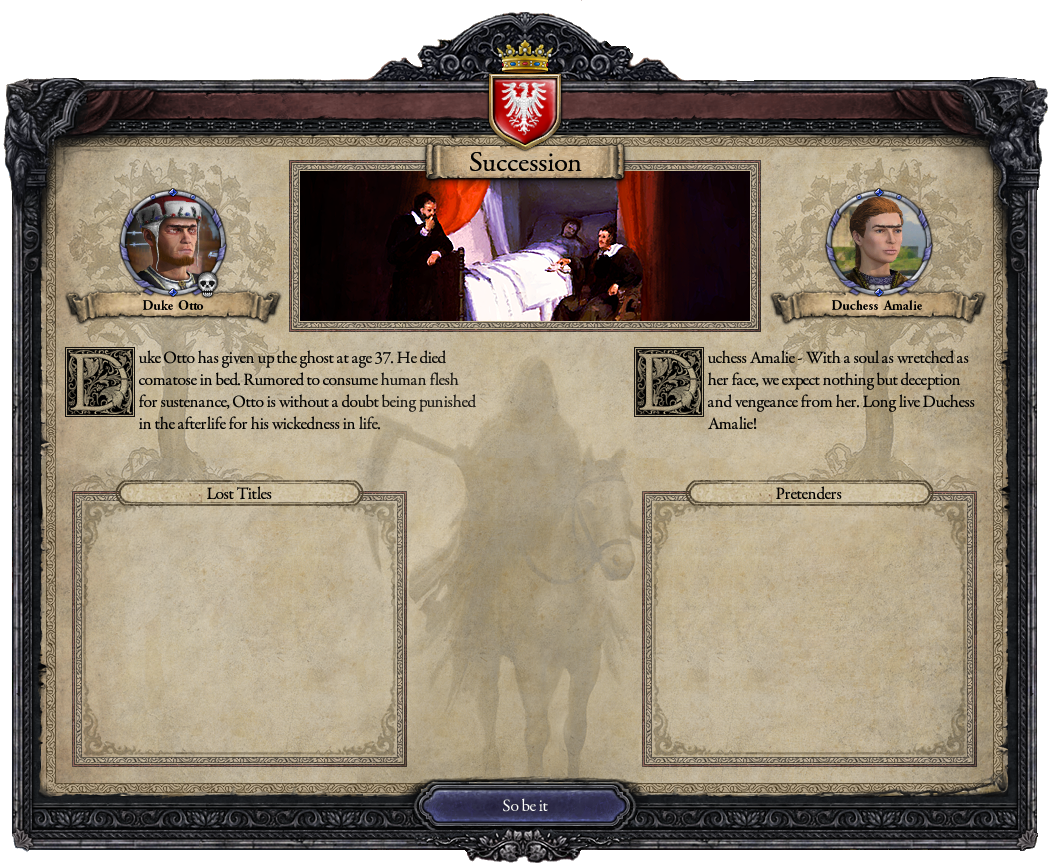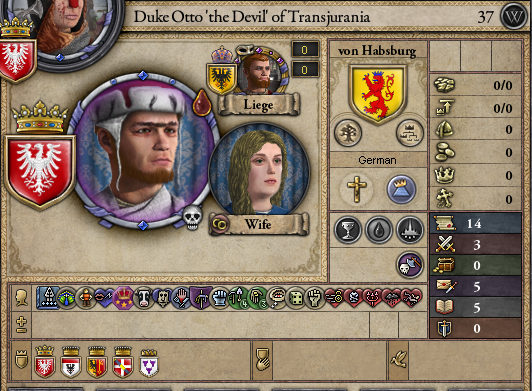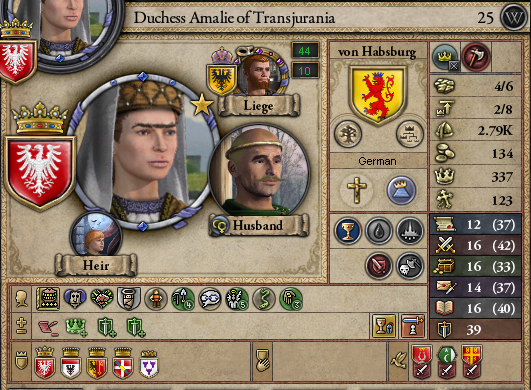Chapter 5: Devil’s Due
The people of Transjurania are woken by a fanfare on the morning of 18 March 1083: Albrecht von Habsburg, the firstborn son of Duke Otto, is born. His intellect appears to be somewhat lesser than even the average babe, so Otto arranges a betrothal to a Russian genius named Malfrida de Rusa.
That November brings both joy and sorrow to Otto’s Satanic second family. On the fifth they welcome King Vratislav to their ranks, but on the eleventh they say goodbye to Cristina de León. Having been corrupted in both body and soul following Duke Otto’s carnal initiation ritual, she had contracted cancer and lost her battle following one final Friday night bacchanal. She was only 55.
After nearly three years of planning, Otto’s unspeakable plot against his step-brother goes into action on 2 February, 1084. Sviatoslav Romanovich Rurikid dies at the hands of an apparently mentally unstable maid (at least as far as the Hungarian court is aware). Yet not a fortnight later, on the 13th, Mária of Hungary gives birth to a second son, Yemelyan. In unrelated news, some peasants in Basel were found brutally murdered the next morning. The spymaster Theodorich finds his already-lengthy stay in Hungary extended.
Thankfully for those around him, Otto has too preoccupied with other affairs to bother (fully) taking out his frustrations on his court. In addition to his known ongoing research at the observatory, Otto secretly has been participating in regular orgies hosted by fellow Satanists, and the long nights of carnal delight result in a more lean, muscular physique. However, he continues to indulge in strange brews like the one given to him by Ioustinianos, and as a result he starts to act possessed by some mad demon. He becomes increasingly withdrawn and isolated in the observatory, trying to comprehend the strange phenomena he finds in the universe. Finally, not too long before the night of Sviotoslav’s murder, even Otto has to declare himself to be at his wit’s end. Envoys are dispatched to locate anyone in the world who might have any notes of their own on such things. Finally, in July of 1084, one returns from Mesopotamia with a promising message: An Arab scholar named Ibrahim claims to have detailed research on just the sort of subjects Duke Otto has been studying. However, the old man refused to allow the envoy to so much as copy his notes, or to be escorted back to Basel. The envoy swallows as he works up the courage to relay Ibrahim’s demand: “He says you must go to Baghdad to see him yourself, milord.”
To the envoy’s shock (and later relief), rather than fly into a fit of rage, Otto embraces the envoy and whoops with joy. “My good man,” he exclaims, “You shall be duly rewarded for this invaluable service! I will gift you 50 acres of good land and a hefty sum of money so that you may build a new farm and hire your new workers!”
“Thank you, milord,” replies the the envoy. “I will be overjoyed to tell my wife!”
“Well, about that,” Otto adds in a concerned tone, “I’m afraid you won’t be able to tell her yourself. Guards, seize this man!” The castle guards, who had been dismissed from the great hall along with everyone else when the envoy had arrived, re-entered the room and seizing the man’s arms, forced him to his knees.
“I beg you, milord, spare my life! I have done you no harm, borne you no ill will!”
“Fret not, sir, for your life is not in danger. I specifically picked you and the others because you were illiterate and therefore, once your tongue is removed you will be wholly unable to share what you have just told me with anyone else. A much better arrangement for you than had you the ability to write a book about your quest, would you not say? For in that case I would’ve been forced to remove your whole head and not just the tongue.”
The envoy is speechless at this madman’s logic.
“Well, it seems you won’t miss your tongue, since the cat has already taken it,” the duke observes with a sinister chuckle. And with that he leaves to go prepare for his journey, the man’s screams following after him down the corridor.
The journey is long and difficult, but miraculously, Otto arrives in Baghdad in one piece on the twenty-eighth of October. He seeks out Ibrahim at the House of Wisdom, but no one admits to knowing a man fitting the description Otto was given. Seemingly defeated, Otto retires to sup at a local inn, but is approached by a veiled woman in black.
“
As-salaamu alaykum, stranger,” the woman greets him. “It is said that you seek the
rajul hakim, the wise man Ibrahim Nazari."
“You know the man?” Otto replies. “You seem to be the first in this city to know that name other than myself.”
“You are mistaken, stranger, for very few in Baghdad do not know the name, but fewer than those would dare to admit it. Nazari was once a respected
sufi and scholar in the House of Wisdom, but he began pursuing lines of inquiry that frightened even the mystics and those at the House who claimed to be open-minded. Now he is a pariah of the city, continuing his research in the privacy of his own home on the outskirts of the city.”
“Do you know the way, good lady?” Otto asks eagerly. “I will compensate you fairly to escort me hence.”
“I do,” affirms the woman, “but do not hope to be given entry. Nazari does not have much care left for visitors, having been subjected to raids and ridicule in equal measure since his expulsion.”
“I have not come all this way to be turned aside by fear of rejection. Lead the way, madam.”
The walk from the center of such a large city to its edge was a long one, but at last they arrive at a house the woman claims belongs to Ibrahim Nazari. Otto tosses her a gold coin and sends her on her way. His bodyguards knock loudly on the door. It takes many attempts before the man himself answers.
Ibrahim Nazari’s beard is long, gray, unwashed, and unkempt. His robes look about the same. His face is like cracked leather, but his eyes blaze with an amazing vivaciousness for a man so old he could’ve been mistaken for the first foundation stone laid in the city he called home.
“Who are you to disturb an old man at so indecently late an hour?” he barks furiously. “Begone! or I shall hex the whole lot of you!”
“Master Nazari,” Otto says calmly, “I am Otto von Habsburg, Duke of Transjurania. I understand you spoke to a representative of mine, about a year ago. You told him you have research on phenomena from beyond our world. I am here with research of my own.” He motions, and a bodyguard hands Nazari a bound copy of Otto’s notes, translated into Arabic. “I would be most pleased if we could compare our findings as two curious scholars.”
Nazari glances over the notebook. “This appears to be legitimate,” he concedes, “but I must examine the whole of it and verify that it is an authentic journal from start to finish. You would not be the first to scribble some invented research onto the first page of a blank book in order to trick me into revealing my secrets. Return at midday tomorrow.” Without another word or even a pause to let Otto respond, he closes the door.
At noon the following day, Otto returns to Nazari’s home and the old scholar, having apparently spent the entire night reading Otto’s notes, finally invites his guest inside, but only the duke himself. Otto’s guards look wary but their master orders them to remain posted by the door, only to enter if he calls for them by name. Following Nazari inside, Otto carefully weaves through towering piles of papers and books, discarded food left on the floor, and other items Otto decided against deducing the origin of. Nazari stops in front of a curtain hanging over an alcove set into an interior wall of the house.
“You and I are not the first to investigate the things we have observed,” he explains. “Before even I was born, there was another scholar who became the closest thing to an expert as a mere mortal man can become on these matters. They called him Abdul the Mad, and this is the only surviving work that bears his name.” Reaching behind the curtain, Nazari produces a thick tome with a cover that seems blacker than night. A blood-red leather strap seals it shut.
“This is the Necronomicon. Well, a copy of it, at any rate. The original I keep in a secret location known only to me. You have proven yourself a scholar worthy of reading its secrets, but I must warn you: it is said to drive whomever reads it as mad as the author. I got lucky, as you see,” he remarks, picking a loose crumb of a previous meal from his beard and popping it in his mouth. “So, if you truly want to risk it, I’ll be willing to part with it for a modest sum of gold. Just enough to pay for the materials to recopy it."
“Risk it? My dear fellow, they already call me mad! I have nothing to lose and only untold wealths of knowledge to gain from this book! Here, have your money!” he says with a smile, tossing Ibrahim Nazari his entire purse. “For a book this priceless, any amount of gold I spend on it is a bargain!”
The return journey is prolonged by the onset of winter, but Otto finally returns to Habsburg Castle in the summer of 1085. He is not home long before ill news from Poland: Kazimierz of Gostynin, the husband-to-be of Amalie von Habsburg, has died of leprosy on 15 August, just eleven days shy of his eighteenth birthday. The possibly of uniting the Hungarian and Polish thrones under the Habsburg banner is apparently not to be. Amalie, who just two days before Kazimierz’s death had celebrated her own birthday (her twelfth), is devastated, and refuses to have her hand be given to another.
Fate may have taken one opportunity from Otto and Amalie, but in return she spares them some effort on the first of October, when the sickly Yemelyan dies of natural causes. Amalie’s ascension to the throne of Hungary is now all but secured.
Otto decides that with his family’s ambitions for Hungary secured, it is finally time to open up the Necronomicon and unravel its mysteries. What he discovers is beyond his wildest imaginations. Once he might have doubted in the supernatural before, but now, with the understanding granted him by the Necronomicon, he realizes that there must be divine, cosmic forces at work beyond mere mortal comprehension.
“Great Satan!” he shouts into the void, “Forgive me for worshipping you in name only for my own selfish gain! I will be your faithful servant evermore!”
“Excellent,” replies a malevolent and unseen voice.
With the birth of Werner von Habsburg on 18 February 1087, Otto manages to secure a betrothal to Queen Mária’s daughter Feodosia, re-establishing the Hungarian alliance and allowing him to defend his step-mother’s title against the pretender Princess Ilona and her sponsor, Duke Radovan Trprimirovic of Slavonia, who have been at war for six years at this point. With the extra help, Mária secures a white peace with the High Chief of Bolghar, against whom she was pressing Duke Árpád Gyula’s claim, in 1088. Otto attempts to use his dark Satanic power to kill Ilona with smallpox and end her threat to his step-mother’s (and more importantly, half-sister’s) throne permanently, but she miraculously make a full recovery. For his troubles, Otto is rewarded with a lisp, preventing him from correctly pronouncing “smallpox” ever again. However, the Duke of Slavonia’s luck eventually runs out, as he is cowed into admitting defeat in 1090.
Other exciting events occur for the Habsburg family during the war. On 18 April of the same year as the peace with the Bolghars, Etienette von Habsburg is born and betrothed matrilineally to the young King Humphrey de Hauteville of Sicily, thanks to some sweet-talking of Humphrey’s guardian and great-uncle, Duke Roger of Calabria. Ida von Habsburg also returns home after her husband Bretislav is appointed by the Pope to the bishopric of Plasy, annulling their marriage. As it so happens, her now former father-in-law, King Vratislav, is waging the Second War of the Polish Succession.
King Vladislav had died on an infected wound on September 6, 1087, and his son Nikolaus had succeeded him at only a year old. Fearing a Piast restoration, King Vratislav decided to preemptively depose his grandson in favor of his second son, the unlanded (and unmarried) Boleslav. Mass confusion erupts among the common-folk of Poland as in their confusion they believe that they are being attacked by their recently-deceased king, risen from the dead.
Otto is able to invite Boleslav to Basel and introduce him to Ida. Boleslav is so enamored of Ida that he accepts her brother’s condition that any children of the couple bear the surname Habsburg. A Habsburg-ruled Poland is now back on the table.
Thus the House of Habsburg welcomed a new decade, and what an eventful decade it would turn out to be! On 3 May, 1090, with the help of master diplomat Bishop Guilhelm of Aubonne, Otto manages to secure enough support from Counts Burchard of Neuchatel and Rudolf of Bern to pass a new Succession Act, making the Duchy of Transjurania an elected title. He immediately nominates his half-sister, Amalie, and although the vassal counts aren’t inclined to trust the judgement of a possessed and arbitrary lunatic, Amalie’s brilliance and virtuous nature win over their unanimous support.
That same year, Otto comes to the aid of his step-mother Mária in a war against…somebody. The details are unfortunately lost to historians, historians rumored to be from the same family as the oafish and ill-fated advisor to Werner. The war continues into 1091, at which point Duke Pierre of Savoy decides he has had enough of Otto’s endless list of excuses for not fulfilling his father’s promise to return Genfergau. Pierre declare a war to reclaim the province while Otto is away campaigning in Hungary. Unfortunately, Pierre miscalculates the willingness of the Duke of Franche-Comté and the King of Bohemia to come to Otto’s defense. His army is easily repelled and he surrenders without ever fighting Otto or any actual Transjuranians in the field. 1091 is a good year all-around for allies of the Habsburgs, as Boleslav Premyslid wins his bid to become King of Poland on 8 February.
1092 is a quieter year, marked only by the passing of Kaiser Gottfried on 27 September 1092, in battle against Count Ludwig of Schwaben. The new Kaiser, Heinrich V von Nordheim, Duke of Bavaria, unfortunately decides not to renew Otto’s position as chancellor.
The year 1093 is another busy one for Duke Otto and the Habsburgs. He and Gisèle mark the birth of their fifth and final child, a daughter named Elisabeth, on 18 June before Queen Mária calls Otto to her defense for another unremembered war. Upon discovery of this lapse in historiography and the previous one, the Transjuranian Historical Society gets a new head, as do the pikes outside Habsburg Castle. Amalie is also finally married, to the quick-witted rogue Martín Flaínez of the Castilian House of Osorio.
The only fly in the ointment is Otto’s worsening relationship with his ward, Gundo Lotharling, son of the court chaplain of Amalfi. The fourteen-year-old lad is learning perhaps too well from his tutor, and is developing ambitions of his own. “One day,” he vows to Otto, “I will be even greater than you!” Otto dismisses Gundo’s dream out of hand, but this only serves to fan the flames of Gundo’s growing rivalry with him.
To top the year off, Otto recreates his macabre outing with his now-departed Ioustinianos of Amphissa, passing the torch to Isabel d’Urgell, Dowager Queen of Aragon (her husband, King Sancho Jimena, died a duel with the Emir of Zaragoza in 1067). This time, however, Otto goes one step further than he had originally and out of curiosity prepares a meal out his victims. Sadly, if he gained any profound insights from his cannibalism, we’ll never know, as he foolishly also introduced Isabel to the tradition of drinking Ioustinianos’ strange brew after the fact, and afterwards his mind was permanently dulled.
Amalie and Martin have a son, named Simon, on Valentine’s Day 1095, who inherits Amalie’s genius. At his birth he appears quite sickly, but thankfully he will survive. He is betrothed to Jelena Dukljanin, a Serbian babe with a sharp mind.
The following year, King Boleslav and Queen Ida welcome a son of their own. At 24 inches long, "little" Helferich von Habsburg is anything but. Poland now has a Habsburg heir of its own.
The happy news, however, is not enough to stave off Otto’s growing depression. With his mind no longer what it was, Otto has decided to study the art of rulership in more detail to offset his impaired faculties. For the first time, he begins actually listening to supplicants who come to him seeking redress, but he is increasingly frustrated with his own inability to come up with any solutions for them. He questions what joining the cult of Lucifer got him in the end. All the fear and bloodshed he carried out, and what did he gain other than a corrupted mind and body.
“Even my onthe-hanthome fathe ith turned repulthive,” he remarks to his reflection through his lisp, which makes him cry even more. Of all the afflictions to be cursed with! He, Duke Otto von Habthburg of Tranthjurania!
To add insult to injury, Otto realizes that his work to designate Amalie as heir to both Transjurania and Hungary will come to naught if she should inherit Hungary first. His vassal lords would no longer consider her a worthy successor, fearing she would be a Hungarian queen first and a German duchess second. However, should Otto die before Queen Mária, and Amalie begins her life as a ruler in Transjurania, then the titles could be successfully united in the same branch of the family.
On 20 November 1096, after hearing now the now seventeen-year-old Gundo Lotharling make cruel jests at his expense at a feast in the great hall, Otto has a now-rare spark of genius on how to end his suffering and troubles.
“Gundo, I have endured your dithrethpect for far too long!” he bellows. “You and I will settle this animothity between uth tomorrow at dawn! If you are brave enough to inthult me in my own hall, you thould be brave enough to thwing a thword!”
The two foes meet in the courtyard of Habsburg castle as the sun rises. Otto is decked out in his finest ringmail, with the sigil of his house embroidered on a doublet over top. Gundo has only a simple steel helm, a leather jerkin, and a shield bearing the tripartite orange emblem of the Lotharlings as his protection. When marshal Alberic de Comminges signals the duel to begin, it is immediately apparent to all those spectating that Otto, a diplomat and plotter, is out of his element in a one-on-one fight. The younger Gundo effortlessly blocks and sidesteps Otto’s slow and simplistic attacks. It takes him less than a minute to put his liege on his stomach, prostrate on the ground.
Here it comes, Otto says to himself.
Release at last. He closes his eyes right before he feels the blow to the back of his neck and he looses all sensation in his body.
Well, he thinks,
that was less painful than I thought.
“YOU DISGRACEFUL CUR!” comes a voice out of the darkness.
What? wonders Otto, opening his eyes.
Wait…how do I still have eyes that can open?
Otto is mortified to see the flagstones of the courtyard in front of his face again. He tries to scramble to his feet, but nothing happens. He feels the ghost of his body, but all true sensation is gone. Someone turns him over onto his back for him.
“Brother!” It is Amalie. A welcome face, if not the most comely. Otto tries to call her name back, but not even his mouth will obey him and only a gargle escapes his lips. Behind her, Otto just barely catches a glimpse of Alberic and his guards apprehending Gundo. Amalie must see where his eyes are focusing, for she gives a puzzled look to him, then a glance over her shoulder, and rises back to her feet to address the marshal.
“Unhand him!” she commands. The men-at-arms pause but do not comply. Amalie stands up proud and straight, with her head high and her voice clear and confident:
“I am my brother’s heir and designated regent. He has been paralyzed and cannot speak, therefore I shall speak with his voice, and you shall answer and obey it! This man, dishonorable as he may be, has committed no crime. He and my brother were engaged in a lawful duel of honor. Had he the spine to kill his opponent outright, you would be outside your jurisdiction to detain him, and he has done less than that. As much as it pains all of us, you will release him, or else your heads will join wherever you intend to place his.” Reluctantly, the guards obey.
“Thank you, milady,” says Gundo, but Amalie turns her back to him.
“Save your thanks, for I do this not for your sake but for the sake of my own soul and theirs. You are still the lowest of creatures. The Devil had more honor when he deceived Eve in the Garden than you have shown here today. You are no longer welcome in my brother’s domain. Leave at once, or this time I will be within my rights to see you hang.” Stricken by her fierceness of will, Gundo gets to his feet and exits the courtyard. He does not even stop to retrieve his personal belongs from his bedchamber.
Thus Amalie von Habsburg begins her rule of Transjurania as her brother’s regent, a welcome change as in his current state, her skills exceed his in all but Diplomacy. Not to mention she’s a lot more level-headed.
In March 1097, Queen Mária of Hungary declares a Holy War to take the Duchy of Oltenia from the Orthodox Pechenegs hordes. Otto, through blinks and moans, gives his approval to Amalie to send his levies to her mother’s defense one final time, in the hopes that Amalie can inherit an even larger realm. Sadly, the Pechenegs prove as tough a foe as ever, and the war will eventually in a stalemate, but not until after Otto’s passing on 7 November. The Duchy of Transjurania officially passes to Amalie. The dark days of Otto ‘the Devil’ are over. The legendary reign of Amalie ‘the Wise’ has only just begun.
Next Time…
The new Duchess Amalie engages in her own, slightly less occult research while elevating the Habsburgs to new heights of influence in the Empire.





